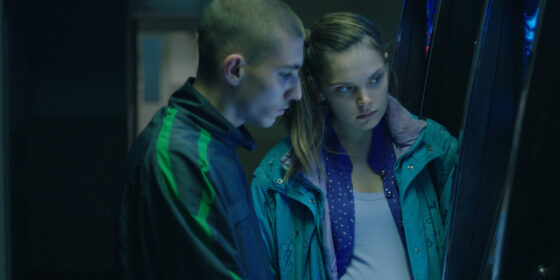Sole (Carlo Sironi, Italy/Poland) — Discovery

By Clara Miranda Scherffig
It is always surprising how many filmmakers deploy the narrative device of a pregnancy in order to explore the emotional and social depths of male characters. This is the case in Sole, the first feature by Italian Carlo Sironi. Ermanno (Claudio Segaluscio) is a young man who spends his time engaged in gambling and petty crimes. When his uncle offers him the opportunity to make some more illegal money guarding Lena, a young Polish woman, he initially views it as just another way to make a living. Lena (Sandra Drzymalska) is pregnant, and the scheme is for Ermanno to play the baby’s father, and then hand the child over to his sterile uncle and aunt as new adoptive parents.
“One spends his own money as he pleases,” states Ermanno laconically. But Sole (Italian for “sun,” and also the name given to the newborn baby girl) is less about financial scarcity than emotional emptiness. Set in the seaside town of Nettuno (which brings about some rather weary Pasolinian memories), the film unfolds within the turquoise walls of Ermanno’s jail-apartment, the grim interiors contrasted with recurring shots that look out through closed windows onto vast natural landscapes. Freedom and warmth is reflected upon Lena and Ermanno as a pale shadow of the outside world, inaccessible and even hostile for them to navigate. Initially uneasy with each other, they at first kill time apart while waiting for the birth, but with the arrival of Sole they slowly grow closer, until the original design of their agreement doesn’t feel so right anymore.
Sole is a reserved film, its rhythm controlled by silent, hyper-composed, mostly still shots, ut the otherwise flat narrative is stirred by several nearly imperceptible movements. Sandra Drzymalska is a revelation: her simple “Yes” and “No” answers are loaded with shades of meaning that a full sentence couldn’t articulate so aptly. The screenplay, co-written by Sironi, Giulia Moriggi and Antonio Maca, holds everything together, allowing for suspense and even a little comic relief, where the visual framework or the characters’ study would have seemingly suppressed any flickers of emotion. At one point, a blackout sets the mood for the intimate tension between Ermanno and Lena to finally get released. When the lights come back on too soon, Ermanno reaches for the switch himself. Sometimes life needs a little magic; sometimes—or finally—a little action.
Clara Miranda- « Previous
- 1
- 2


